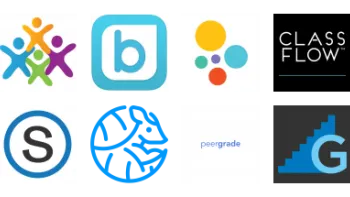Take a look inside 8 images
Classcraft
Pros: Instant feedback and accountability encourage students to act responsibly, and teachers have quite a few options for customization.
Cons: Depending on how it's used, the experience could be more punitive than supportive.
Bottom Line: When used thoughtfully, this classroom gamification can encourage positive behavior and develop essential collaboration skills.
Classcraft integrates easily with everyday classroom activities, encouraging teamwork and collaboration while giving students instant feedback on soft skills, such as attendance, cooperation, homework completion, and classroom behavior. Use the game to motivate students, awarding points when they encourage classmates, complete assignments on time, respect noise levels, and more. Even if students are cooperating just to level up at first, with teacher support, they'll likely learn valuable SEL skills along the way. Creative teachers might even find a way for students to nominate others for points, which may encourage them to see the good that others do.
Teachers can, and should, tailor the experience to their classes by adapting the game for their students' unique needs and personalities. Being attentive to these details up front will help craft a virtual environment of positive reinforcement rather than a punitive one. Teachers can also use the program to teach concepts through a gamified storyline, pulling assignments in from your computer or Google Drive or writing the story yourself. Be careful, though: Once the creative juices get flowing, it can be easy to get lost in your own adventures. Also, some of the preset powers and events may cause strife, especially among younger students. Be sure to take a close look and customize them as necessary. For example, optional random events include suggestions such as "The selected students must be silent for the entire class." Although that may work well in some classrooms, students who are struggling may feel targeted or might be expected to behave in ways that are unrealistic for their age.
Classcraft is an online and app-based fantasy-themed behavior and learning-management platform with a role-playing game (RPG) theme. Students take on roles of cool avatars with special powers who earn or lose experience, gold pieces, crystals, and health points depending on their performance on tasks, quests, battles, and more. Teachers set up games and manage students via a dashboard. Students are assigned a character -- Guardian, Healer, or Mage -- and work individually or in groups to gain experience through positive behaviors and academic achievements. Classes progress through Chapters, which introduce new features gradually. As students level up, they earn powers with real-world effects, such as a chance to eat a snack or earn a break during class, or five minutes to talk at the end of class. Students can also lose health points via random events or for negative behaviors; these events lower their scores unless another player intercedes on their behalf. Students who lose all of their health points must face consequences set by the teacher, such as cleanup duty or loss of privileges. For the scenarios, there are preset suggestions, but teachers can customize them to fit their classroom climate. Quests and boss battles can be a unique way to immerse students in learning or reviewing concepts, and if teachers don't have time to set them up, they can browse and import them from the library of material on the site. Note that some features are available only with a paid account.
Classcraft also provides tools for student engagement via features like discussions during quests, special powers, and gold pieces, which students can use to outfit their avatars or spend on real-life classroom items. Plus, parent accounts let grown-ups keep an eye on their child's performance and award extra gold pieces if the teacher allows it. The knowledge center contains tutorials, teacher forums, and an interactive chat feature, making the game an all-around collaborative experience.
By putting students into teams where success is contingent upon cooperation, Classcraft puts a new spin on traditionally individualized behavior management. Since students work together within the game's premise, the issues that arise feel like challenges to be tackled together. Features such as the Makus Valley volume meter and boss battles for formative assessment keep students on their toes and accountable to their teams, while the quests allow teachers to differentiate instruction by modifying complexity and allowing students to move at their own pace. It should be noted that instant feedback via projection capabilities or 1-to-1 devices informs the entire class when students take damage, so teachers may opt to show students only their group's score, especially in cases where negative feedback could create problems with sensitive students. Also, teachers should be mindful that some students may be experiencing hardship or trauma that may affect classroom behavior; relationship-building should take precedence over behavior management. Students who have tiered interventions in place can work toward positive outcomes as well -- teachers just need to be sure to protect their confidentiality.
Setup entails quite a bit of work, but the silent authority the game allows teachers may be preferable to direct confrontation. While explicit teaching of social skills and conflict resolution will be an important factor in the game's success, most students will enjoy striving toward real-world powers and will find the immediate feedback helpful and playful rather than negative. In addition, the game's developers are responsive to user feedback, regularly upgrading and updating the system for a more streamlined user experience.


















